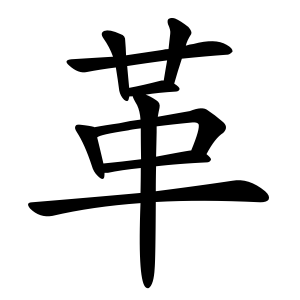革
- leather;
- animal hide;
Etymology
Usage in Korean
This character is used in words like 革命 (revolution) and 革新 (innovation). Additionally, 革 is used as a variant (通假字) of 䩯, which means a severe or critical illness.
When used as a radical, it generally indicates meanings related to leather or leather products.
The radical usually appears on the left side as a semantic component but can sometimes appear underneath the character.
Examples of characters using this radical include:
靴 (shoe)
鞍 (saddle)
鞏 (to strengthen)
靭 (tough, flexible)
Additional notes
Characters with 革
13 strokes
革
가죽
혁
geuk
hyeok
Kangxi radical:177
Strokes:9
Unicode:U+9769
Cangjie input:
- 廿中十 (TLJ)
Composition:
- ⿱ 廿 ⿻ 中 一
